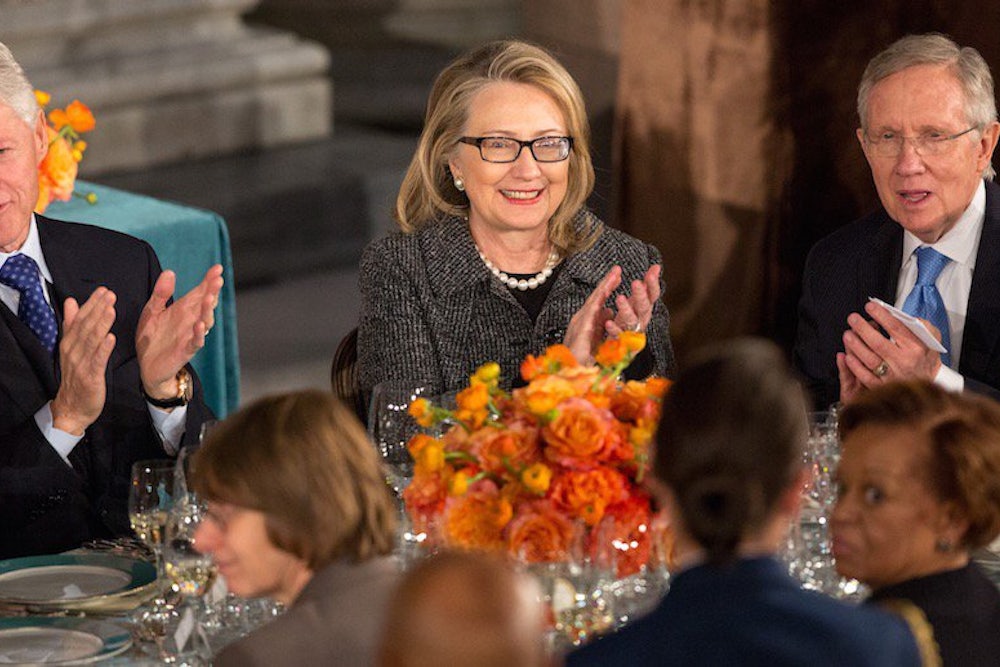In an interview this week with New York Times reporter Adam Nagourney, Senate Democratic leader Harry Reid offered what might be called the Melvin Konner case for a Hillary Clinton presidency:
He called Mrs. Clinton, the secretary of state under Mr. Obama, the obvious favorite to win the presidency, for one overwhelming reason: "This is the time for a woman to run."
"Women and some men, like me, if they are anything like me," he said, "they have come to the realization that women have qualities that we’ve been lacking in America for a long time, to be the leader of the country."
"Women are much more patient," Mr. Reid said. "They can be, if they are pushed the wrong way, combative, but they are not combative. A lot of we men are combative just by nature."
These are—to put it mildly—far from the worst things anyone’s ever said, or wanted to say, about Clinton. But they’re also not comments about Clinton herself, exactly. Reid wasn’t claiming that Clinton has given any evidence of patience, or whichever other “qualities,” just that because she’s a woman, she’ll somehow exude all of this, and appeal to voters who think the White House needs a feminine touch. Given remarks Clinton herself made this past December about women’s special coalition-building abilities, her camp may even encourage this sort of talk.
There’s nothing wrong with citing Clinton’s gender as a reason she should be president. But the argument for a female president—and more women in positions of power generally, in and out of politics—isn't that women are more nurturing or cooperative. It’s not because, if a woman were in charge of this country, there’d be no more wars, just cupcakes and Pinterest. It’s because of issues of fairness and representation.
The fairness argument is straightforward enough: If one accepts that unfair obstacles have kept women out of the White House, the election of a female president would be a step in the right direction.
The representation argument is a bit more complicated. There are special qualities a woman, as a woman, would bring to the presidency, but they’re not personal qualities like empathy. They’re ones that relate to the ability of women to identify with issues specific to women—either to discrimination women have faced, or reproductive concerns unique to the biologically female (a group that, yes, includes some men, and not all women). That doesn’t mean taking any particular stance on those issues. Nor does it mean that those whose identities don’t relate as directly to a given issue should lack a say. It just means that different perspectives add value. When Clinton draws attention to her identity as it relates to an issue like parental leave, she’s not pointing to ineffable feminine traits, but to the ways women’s specific life experiences can bring about a different perspective.
The absurdity of appealing to positive stereotypes becomes clear if you replace “women” with any other marginalized group. It’s presumably obvious why a call for greater Asian-American representation in politics shouldn’t be framed in terms of purported strength at math. It’s not just that citing clichéd generalizations will put people in the wrong jobs. (Anyone who’d hire me for financial wizardry would be sorely disappointed.) It’s also because there’s no such thing as a positive stereotype.
At best, positive stereotypes are patronizing, compensatory assurances—as if to say, even this group has its strengths! At worst, they’re gently worded negative stereotypes—a way, by omission, of calling a group weak in the areas that actually matter. This is why members of marginalized groups so often bristle at hearing supposedly nice things about them. But more to the point, it’s why highlighting positive stereotypes is never the right way to go if you’re looking to inspire confidence in someone’s general abilities. There’s a way to use Clinton’s gender as a selling point. Alluding to women’s inherent nature isn’t it.
